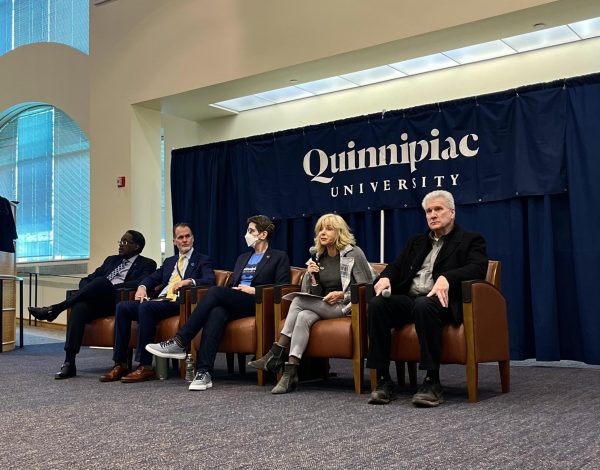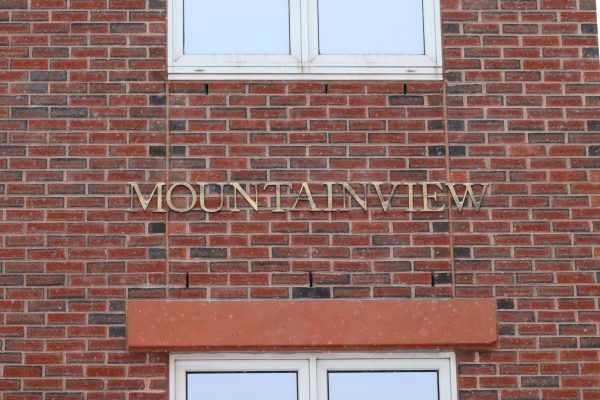Faculty Members Demand Answers
Monday, June 15 Quinnipiac University President Judy Olian sent out an email regarding the 2020-21 school year. That email included a budget shortfall which was due to COVID-19 and a decrease in enrollment over the past two years.
Along with the budget shortfall, thirty-eight faculty and staff will be laid off beginning on July 1, and 120 employees will be furloughed. Since this information has gone public the Quinnipiac community has demanded answers from the administration.
A “Letter Supporting Laid-Off Colleagues” was sent to a number of faculty and students at Quinnipiac University during the week of June 20. It is uncertain who started the letter but more than 100 people have signed the letter in agreement to have their questions answered.
As stated in the letter, it’s main focus is on faculty layoffs. “We stand in solidarity with our laid-off staff colleagues as well. We ask for a transparent report of your financial calculations and decision-making process and the immediate reinstatement of all those affected.”
The letter was addressed to,
- Board of Trustees
- President Judy Olian
- Provost Debra Liebowitz
- Interim Provost Jennifer Brown
- Vice President Elicia Spearman
- Dean Janelle Chiasera
- Dean Anne Dichele
- Dean Bruce Koeppen
- Dean Justin Kile
- Dean Lisa O’Connor
- Dean Matthew O’Connor
- Dean Chris Roush
- Dean Brad Saxton
- Dean Robert Smart
Addressed in the letter were five detailed concerns.
- You refuse to share the actual, detailed accounting of our financial situation.
With full access to the relevant data to assess our financial situation, faculty could use our expertise and ingenuity to devise creative solutions to protect our colleagues, who now find themselves unemployed in the midst of an unprecedented economic and public health catastrophe. Instead, you invoke only some numbers and calculations without rationale or context. There may be good reasons behind some of your decisions, but since we were not privy to them, they seem inequitable and rash. While faculty pay cuts were involuntary and based on an explicit sliding scale, the leadership team’s pay cuts were voluntary and cloaked in secrecy. Capital programs have been “slowed” rather than halted. You have declared a hiring freeze in one breath and mentioned an incoming “Chief Experience Officer” in the next. You have chosen to buy some number of “Zoom Carts” without clarifying their cost or consulting with faculty members on their pedagogical efficacy. Without a fuller accounting of the costs of the university, we can only guess at the other decisions that have been made. Faculty are at the heart of the pedagogical mission of this university; as vital stakeholders, we should have a voice in these decisions.
- Your short-sighted cost-cutting measures harm faculty, who are core to the future of the university.
Student enrollment numbers and our increased teaching loads demonstrate that the university still needs the services these faculty provided. You do not allege that the eleven faculty members who were laid off this week were not performing their jobs well. Indeed, we know them as exemplary teachers, scholars, and community members; had we been given any voice in the proceedings, we would have gladly shared that information. Your motives here seem opportunistic. You replace full-time professors with adjunct instructors, and adjunct instructors with the remaining full-time professors, whom you force to teach more and larger classes. We in turn must now accept the same (or lower) pay for substantially more work. The university thus substitutes more expensive labor with cheaper labor, and cheap labor with free labor, cutting costs at the expense of real people.
- You fail to adhere to your legal and ethical obligation to share governance with your faculty.
Traditionally and legally, faculty members are responsible for personnel issues within their departments. It was upon this understanding that the Supreme Court determined that tenure-line faculty could not unionize because they are managers [see NLRB v. Yeshiva University 444 U.S. 672 (1980)]. Indeed, our own faculty handbook specifically delineates the procedures for reducing departments and requires consultation with the dean, members of the department or program, and the school/college. You laid off our colleagues, however, without consulting the constituent faculty in departments, programs, or schools. The resulting process is both arbitrary and capricious. It erodes the job security of all full-time faculty members, tenured and untenured alike, along with the principles of academic freedom and shared governance that allow institutions of higher education to flourish. This process sets a dangerous precedent that we do not accept.
- You materially damage the inclusive excellence you claim as a top priority.
Our Strategic Plan compellingly demonstrates a need for the inclusion of historically underrepresented and marginalized people across our leadership, faculty, staff, and student body, as well as a commitment to recruitment and hiring practices that address this need. The plan states that “recruitment and hiring for all faculty and staff positions will be conducted with mindfulness for the unequivocal commitment to inclusive excellence in the QU community. All students need role models to whom they can relate” (p. 14). Our hiring and retention practices must align with this commitment to “inclusive excellence” for its integrity to be upheld. Among those laid off and given reduced appointments are faculty of color, international faculty, women in male-dominated fields, faculty who identify as LGBTQ, and disabled faculty. Given Quinnipiac’s recent push to diversify our community with new hires, a last hired/first fired strategy disproportionately harms underrepresented faculty. These abrupt lay-offs render our faculty less diverse than before and send our students the clear message that we do not prioritize “inclusive excellence.”
- You irreversibly damage the learning and experience of students.
With residential facilities and extracurricular activities limited due to the current public health crisis, the relationships between professors and students are now more important than ever. Your decisions to lay off important new hires and diverse faculty, cut the university’s adjunct budgets, and require the remaining faculty to teach more and larger courses with decreased resources and time for research and service — even as we pioneer through the Q-Flex experience — fail to prioritize either students or faculty. Instead, these factors will make it impossible to provide the student-centered approach so crucial both to student learning and to Quinnipiac’s survival.
The secrecy and unilateral nature of your decision-making has been so complete that we have even less information about the laying off of staff than we do of faculty. We cannot assume that those decisions were made in a less arbitrary or capricious manner. In light of all these considerations, the only responsible action for you to take is to provide a full and transparent accounting of the deliberations that led to this fiasco and to immediately reinstate our colleagues.
We sign in an individual capacity, representing only our own views, rather than those of any department, program, or committee with which we are affiliated.
Aileen Dever, a professor of Modern Languages in the College of Arts and Sciences signed the letter in solidarity.
“I decided to sign it because the people are the most important part of the university,” Dever said. “It’s really important to remember that people are not pieces of paper and that the students are the reason we are there.”
The letter mentions that a number of underrepresented faculty were laid off and although it’s not confirmed Dever is surprised if that in fact did happen.
“I have been at Quinnipiac for twenty years and I have seen this desire of inclusivity and diversity, and we’re all looking around saying where?” Dever said. “We really need to increase the value of the education for the students. We really need for them to be exposed to greater diversity. It would be certainly very surprising if that happened and the letter is stating that it is, so I can only imagine that it is so.”
Haley Wong who is apart of the class of 2021 and is a double major in athletic training and physical therapy feels as though there has been a lack of transparency.
“However- every decision whether it be personnel, budgetary, racism, or representation has been made from the top down with zero transparency,” Wong said. “This is a problem in my opinion because the people that end up suffering from this lack of transparency and or these decisions are the bottom. The students and faculty are the ones losing resources, enduring racism, fighting to change the culture of the campus.”
Scott McLean, professor of Political Science in the College of Art & Sciences, said there was inconsistency in how the layoffs were carried out.
“Even though I think administration says that department chairs should have been informed, or at least a discussion with department chairs about the layoffs in their department, one of the things that started coming out was, in some schools, some chairs were not informed at all,” McLean said.
Another point that was raised in the letter was the new hire of Tom Ellett. Ellet will serve as the new chief experience officer this upcoming school year.
“It is very sad that there were faculty that were hired in the academic year and were supposed to start at Quinnipiac in the fall and those appointments were rescinded, and yet this administrative position [chief experience officer] was not rescinded and I think there needs to be a better explanation on why that administrative position was so important that it would override faculty hires that had already been made earlier in the year.”
Nonetheless, the management committee did send the following statement to those who signed the letter.
We, the Management Committee, write to acknowledge receipt of your letter dated June 24, 2020, and to provide a perspective on your concerns. We appreciate your candid feedback on recent decisions and know that they are motivated by a deep commitment to our university. As we all recognize, these decisions are framed by the unprecedented circumstances of this moment – two years of enrollment declines and now a pandemic of unknowable scale – forcing upon us very hard institutional choices.
Our university, as well as much of higher education, is facing a level of financial challenge not seen before. As a result, Quinnipiac’s academic and administrative leadership confronted extremely difficult choices to address the immediate financial crisis, while positioning the university for a strong future.
Decisions that impact members of our community are especially hard and emotional. These decisions were made after much deliberation and soul-searching and decision makers weighed many factors, including impact on people, demographic representation and protection against adverse impact, preservation of pedagogical excellence, and distinction in our academic mission – today and in the future.
Deans and administrative heads sought input when possible from individuals in their own schools and units. We consulted also with the Senate leadership and Trustees as part of the process. Because of the late enrollment deadline this year and Board of Trustee budget approval requirements, these decisions had a compressed timeline. That timeline, the complexity of the system-wide judgments that were required, and the need for confidentiality in making these very sensitive decisions precluded a more public process.
During the Faculty Senate meeting last week, we shared additional details about these decisions including the number of non-tenured faculty positions that were eliminated among the total number of layoffs; that we didn’t renew contracts for some visiting professors and changed some teaching contracts from 12 months to 10 or 9.5 months, which is the norm among QU faculty; the process for making these decisions in accordance with established policies and procedures; measures taken to ease the impact on those affected by HR actions; and the budget balances required of institutions to demonstrate financial health. We hope that this information provided additional context for the process and decisions.
Going forward, we will continue our open communication between faculty and the administration, and we welcome your suggestions in areas that can be improved. We strongly encourage faculty leadership’s role in serving as a channel to disseminate information more broadly among all faculty. We also propose re-invigorating the Senate Finance and Future Plans Committee as a forum for regular exchange of budget and strategic information.
We value the caring and respectful relationship between the leadership and faculty of Quinnipiac, and we acknowledge the absolutely central role our dedicated and talented faculty have played in Quinnipiac’s rapid advancement. We look forward to our continued collaboration to meet the significant challenges ahead, as there are many. Together, we can be confident that we will overcome the present setbacks and emerge an even stronger community and distinguished University.
~ Members of the Management Committee
According to the university, Jen Brown, interim executive vice president, and provost, and Elicia Spearman, general counsel and vice president for human resources, did in fact meet with the Faculty Senate on June 22, and they addressed a number of questions about the budget and staff.








